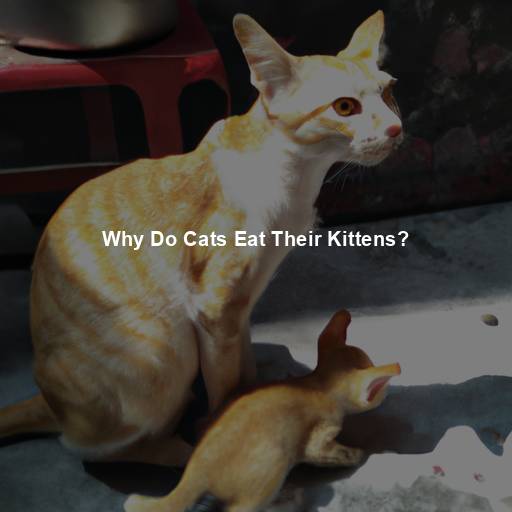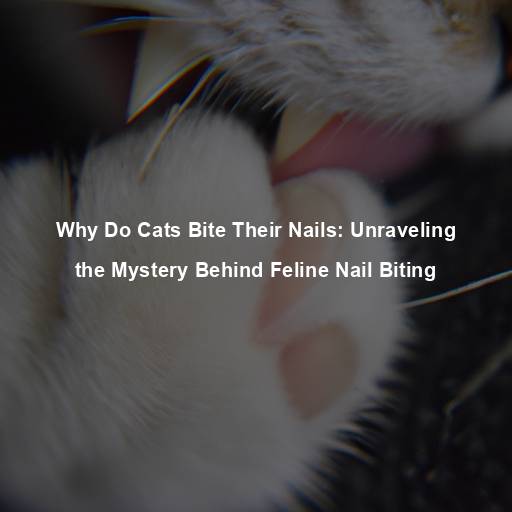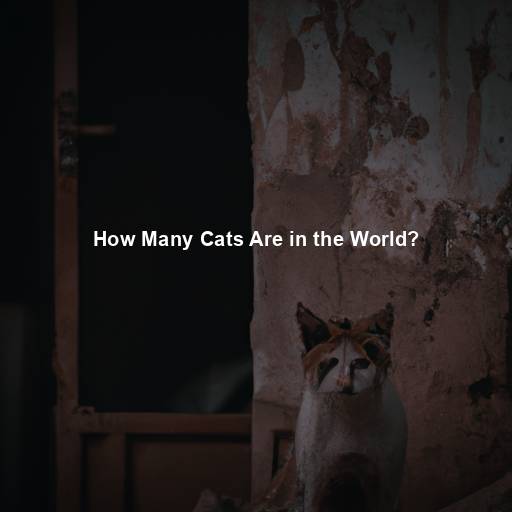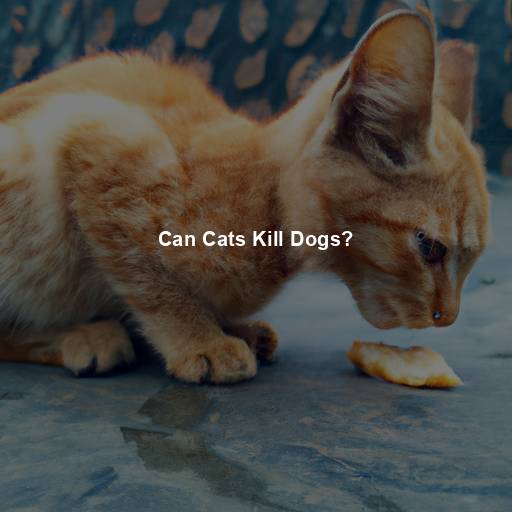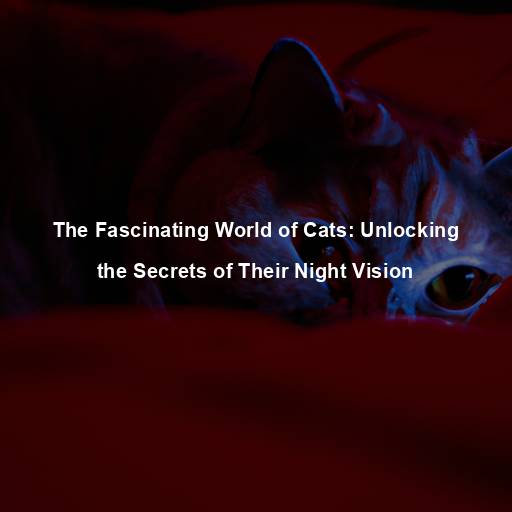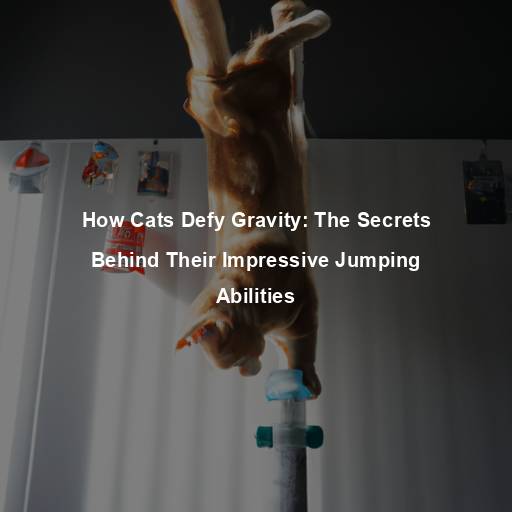Why Do Cats Eat Their Kittens?
Last Updated on November 12, 2023 by Evan
Contents [hide]
- 1 Understanding the Complex Behavior of Mother Cats
- 2 The Role of Social Structure and Learning
- 3 Addressing and Preventing Cannibalistic Behavior
- 4 The Complexity of Feline Behavior
- 5 Embracing the Enigma
- 6 FAQs – Why Cats Eat Their Kittens
- 6.1 Why do cats eat their kittens?
- 6.2 Is it normal for a cat to eat her kittens?
- 6.3 Should I be concerned if my cat eats her kittens?
- 6.4 What can I do to prevent a cat from eating her kittens?
- 6.5 Can a cat eat her kittens for any other reasons?
- 6.6 How can I ensure the safety of the kittens if the mother cat is exhibiting this behavior?
Understanding the Complex Behavior of Mother Cats
Intriguing and enigmatic, cats have always fascinated us with their mesmerizing behaviors. One behavior that has perplexed and disturbed cat owners and enthusiasts alike is the seemingly shocking act of a mother cat consuming her own kittens. While rare, this bewildering behavior has sparked countless questions and raised eyebrows in the feline community. In this thought-provoking article, we embark on a journey to uncover the intricate reasons behind this distressing phenomenon, unravelling the veiled mysteries lurking within the feline realm.
The Disturbing Act of Filial Cannibalism
Filial cannibalism, the act of a mother consuming her own offspring, is not exclusive to cats. It is observed across various animal species, including insects, amphibians, and mammals. However, when it comes to our domestic feline friends, this behavior is relatively uncommon. It is essential to understand that this behavior is not a reflection of the cat’s cruelty or malice, but rather a natural instinct triggered by specific circumstances.
Biological and Environmental Factors
In the intricate world of feline biology and environmental dynamics, it is not uncommon for cats to succumb to perplexing instincts, leading them to resort to the unthinkable act of consuming their own adorable kittens. Curious minds may wonder what unfolds in these enigmatic scenarios where such behavior materializes. Let us embark on a journey to unravel the intricacies behind this phenomenon, shedding light on the puzzling motives driving a mother cat to engage in such peculiar conduct.
Stress and anxiety take a toll on even the most sensitive of beings, including our feline friends. It’s a whirlwind of emotions for them, and sometimes, it can push a mother cat to do the unimaginable – eating her own kittens. This perplexing behavior is often a desperate attempt to navigate through overwhelming circumstances, like feeling threatened or out of place in unfamiliar or hostile environments.
Mother cats, like any other animal, have their own strategies for survival. When resources become scarce, a mother cat may make the tough decision to prioritize the survival of her more viable offspring by eliminating the weaker ones. This primal instinct ensures the best chances for the strongest kittens to thrive, even in challenging conditions where resources are limited. It’s a heartbreaking yet necessary adaptation that showcases the incredible resilience and adaptability of these feline mothers.
The intricate dynamics of maternal instincts in felines can take a baffling turn, leaving us perplexed by their behavior. Despite being known for their caring and protective nature, mother cats can experience a distressing disruption in their instincts. Scientifically explained by hormonal imbalances or underlying health issues, this turbulent state can lead a mother cat to mistakenly perceive her own kittens as potential threats or intruders, culminating in the unimaginable act of cannibalism.
Evolutionary Perspectives
To truly comprehend the reasons behind this behavior, it is essential to explore it from an evolutionary standpoint. Animals, including cats, have evolved complex survival strategies to ensure the propagation of their genes. While filial cannibalism may seem counterintuitive, it serves specific evolutionary purposes:
In the intricate dance of motherhood, feline queens wield an instinctual prowess that may leave some perplexed. By curbing the numbers, these vigilant caretakers pave the path for their offspring’s triumph. Stripping away the less hardy, they craft a lineage built on resilience, fortifying the feline bloodline with the strongest of genes. In this delicate balance between life and loss, the survival of the fittest takes shape, enigmatic yet essential.
In the untamed realm of nature, the safety of fragile newborns is perpetually under siege by cunning predators. In a gripping display of survival instincts, feline mothers take matters into their own paws by devouring their own offspring, erasing every trace of an inviting aroma that might lure in lurking adversaries. This paradoxical act may appear bewildering, but it serves as a formidable shield, shielding the litter from the menacing world beyond.
The Role of Human Intervention
As responsible cat owners and caretakers, it is crucial to provide a conducive environment that minimizes the likelihood of these distressing behaviors. Understanding the factors that contribute to filial cannibalism can guide us in preventing or mitigating this behavior:
Creating a serene sanctuary for your feline friend is crucial when it comes to guaranteeing their overall well-being. Prioritize providing a cozy and secure living environment that shields them from abrasive disturbances, such as erratic noises or encounters with unfamiliar creatures, as these triggers might incite anxiety in your cat. By minimizing potential stressors, you can help your furry companion thrive in a state of tranquility and contentment.
Taking care of your cat’s essential needs is crucial to their overall well-being. Make sure to provide them with a plentiful supply of food and water, as well as a clean litter box. By ensuring their basic needs are met, you can minimize the possibility of them experiencing stress that could potentially lead to unusual behavior, such as cannibalism.
- Monitor the Pregnancy: Regular veterinary check-ups during pregnancy can help identify any underlying health issues that may contribute to abnormal maternal behavior. Prompt intervention and appropriate medical care can prevent or manage such complications.
When it comes to the well-being of our beloved feline friends, it’s crucial to be proactive and seek professional advice when needed. Whether it’s puzzling behaviors or simply wanting to ensure their welfare, consulting a veterinarian or an animal behaviorist can offer invaluable expertise. These experts can guide us through the perplexities of our cat’s world, providing reassurance and addressing any concerns that may arise along the way. Don’t hesitate to reach out and let these knowledgeable individuals shed light on the intricacies of your furry companion’s needs.
Genetic Predisposition
Have you ever wondered why some cats have a tendency to exhibit cannibalistic behavior? Well, it turns out that certain genetic traits might be at play here. Although the exact science behind these traits remains a perplexing mystery, studies have hinted that some feline friends may have a higher predisposition to engage in this alarming behavior due to their inherited genes. However, there is still much research to be done in order to pinpoint the specific genetic factors responsible for this bizarre phenomenon.
Hormonal Imbalances
The intricate workings of hormones in the feline world can throw mother cats for a loop, with their reproductive and caregiving instincts going on a wild roller coaster ride. These hormonal fluctuations that come with the territory of pregnancy and lactation can sometimes unleash a perplexing side of motherhood, leading to behaviors that could just make you scratch your head in disbelief – like cannibalism, yes, you heard that right. So, buckle up and prepare for a burst of bewildering maternal behaviors that will leave you questioning everything you thought you knew about cats and their offsprings.
Lack of Maternal Bonding
In the intricate world of feline behavior, there are instances that leave us puzzled and perplexed. One such enigma is the uncommon phenomenon of maternal cannibalism, where a mother cat, driven by circumstances yet unknown, devours her own offspring. A culmination of intricate factors, from the haunting echoes of a distressing birthing experience to underlying health complications that hinder the nurturing instinct, may contribute to the mother’s detachment. It is also plausible that a lack of socialization and exposure to fellow feline counterparts during her early development might play a significant role in sowing the seeds of this bewildering behavior.
The Role of Social Structure and Learning
Cats, those enchanting creatures whose mysterious ways never cease to amaze us, possess an innate social prowess that sets them apart. Their intricate world is intricately woven, where each feline life intertwines with another in a mesmerizing dance of influence and interaction. From the microcosm of their immediate family to the macrocosm of their feline society, cats’ behavior is shaped and molded, like clay in skilled hands. As they navigate the complex tapestry of social dynamics, one cannot underestimate the profound impact that a mother cat’s social structure and life experiences can have on her behavior towards her precious offspring.
Social Learning
As kittens mature, their curious eyes capture every nuanced detail of their mother’s activities, transforming them into astute observers. It is astonishing to fathom that a mother cat, who herself has witnessed or endured the unsettling specter of cannibalistic conduct within her own feline cohort, might, in turn, manifest similar tendencies towards her innocent offspring. Truly, the force of social learning looms large in determining the behavioral compass of our feline friends, and it is imperative that we diligently confront and redress negative patterns lest they perpetuate across multiple generations.
Disrupted Social Structure
In some cases, disruptions in the social structure of a cat colony or family unit can contribute to cannibalistic behavior. This could occur when a new cat is introduced into the household or when there is conflict or tension within the group. Disruptions in the social hierarchy and territorial disputes can cause stress and anxiety, leading to abnormal maternal behaviors.
Addressing and Preventing Cannibalistic Behavior
When it comes to the perplexing phenomenon of cannibalistic behavior in cats, there’s no simple solution or crystal ball to foresee such unsettling events. However, fret not, for there are measures one can undertake to mitigate the risk and safeguard the overall welfare of both the mother cat and her precious little furballs. So, let’s delve into the intricate realm of feline behavior and explore the peculiar intricacies of preventing, or at least reducing, these unsettling acts of feasting.
Early Intervention
When it comes to feline family dynamics, things can sometimes get a bit hairy. It’s not uncommon for a mother cat to feel overwhelmed or anxious, which can unfortunately lead to aggression or distress towards her own adorable kittens. If the situation escalates, it’s crucial to step in and provide the necessary support. This may involve separating the mother from her offspring and exploring alternative options such as hand-rearing the tiny furballs or finding them a loving surrogate mom.
Professional Guidance
When your feline friend starts exhibiting disturbing cannibalistic tendencies, it’s only natural to feel perplexed and unsure of what steps to take next. Luckily, seeking the advice of a veterinarian or an animal behaviorist can provide much-needed clarity. These knowledgeable experts possess the skills to unravel the complexities behind your cat’s behavior and offer invaluable recommendations on how to address and avert such disconcerting actions. Whether it involves implementing behavioral modifications, adapting the environment, or exploring potential medical interventions tailored to your cat’s unique situation, their professional guidance will undoubtedly bring some much-needed peace of mind.
Spaying and Neutering
Spaying or neutering your cat is not only essential for population control but also has potential behavioral benefits. The procedure can help regulate hormone levels and reduce the likelihood of abnormal maternal behaviors, including cannibalism. Discuss the appropriate age and timing for spaying or neutering with your veterinarian.
Creating a Supportive Environment
Creating a calm and supportive atmosphere for mama cat and her little ones is of utmost importance. It’s vital to provide cozy hideaways, ample supplies, and a serene sanctuary where they can escape any potential triggers. By minimizing disturbances and fostering a harmonious dynamic, we can effectively decrease the chances of any distressing acts of cannibalism.
The Complexity of Feline Behavior
Cats have a rich and complex behavioral repertoire, shaped by a combination of genetic, environmental, and social factors. Cannibalistic behavior in mother cats is a rare but distressing phenomenon that can be influenced by a variety of circumstances. Understanding the underlying causes and taking proactive measures to prevent and address this behavior can help ensure the well-being of both the mother cat and her kittens.
As we continue to explore the depths of feline behavior, it is important to approach these topics with an open mind and a commitment to providing the best possible care for our beloved feline companions. By expanding our knowledge and seeking professional guidance when needed, we can create a safer and more enriching environment for cats and deepen the bond between humans and their feline friends. ## The Emotional and Ethical Considerations
The somber phenomenon of a mother cat consuming her own precious offspring is a topic that evokes a rollercoaster of emotions within the hearts of feline enthusiasts and animal advocates alike. Contemplating this perplexing and deeply layered subject necessitates a delicate touch, a genuine empathy, and an unwavering recognition of the intricate complexities that surround such behaviors, while also shedding light on the profound implications they hold for our comprehension of animal sentiments and well-being.
Emotional Distress
Discovering a mother cat devouring her own offspring can be an incredibly challenging experience, leaving us bewildered and overwhelmed with emotions like shock, sorrow, and an unsettling sense of guilt. However, it is essential to grasp that these distressing actions stem from her deep-rooted instincts and primal survival instincts rather than any intention of wickedness or cruelty. By delving into the profound motivations behind these behaviors, we may find solace amidst the perplexing mix of emotions they evoke.
Ethical Implications
The fascinating subject of cats exhibiting cannibalistic behavior has ignited a whirlwind of ethical considerations. It compels us, as devoted cat owners, to deeply ponder our role as guardians and advocates for animal welfare. In successfully fulfilling our duty, we must create a secure and loving space for our furry friends, actively striving to prevent and address any abnormal behaviors – such as the unsettling act of filial cannibalism – in order to safeguard both the mother cat and her precious offspring.
Promoting Awareness and Education
Exploring the fascinating realm of feline behavior allows us to unravel the intricacies that often baffle and perplex us. By shedding light on the enigmatic phenomenon of cannibalistic tendencies in cats, we can spark a thought-provoking discourse that demystifies common misunderstandings and cultivates a profound comprehension of their innate instincts and adaptive behaviors. Sharing this wealth of knowledge empowers us to dispel misconceptions, foster awareness, and nurture a harmonious coexistence between humans and our furry companions. So let’s embark on this captivating journey, where the veil of uncertainty lifts, revealing a tapestry of intrigue and endless fascination.
The Importance of Human Intervention
When it comes to cats, we need to strike a balance between acknowledging their natural behaviors and stepping in as caring humans to ensure their well-being. It’s no secret that mother cats and their kittens need extra support during this critical time. By creating a nurturing environment, seeking expert advice as necessary, and taking proactive measures to address any potential cannibalistic behavior, we can truly demonstrate responsible cat ownership.
The Ongoing Mystery
In our never-ending quest to decipher the enigmatic ways of our feline friends, we are met with a labyrinth of unanswered questions. The intricate tapestry of genetics, hormones, social intricacies, and personal histories intricately weave together, crafting a labyrinth of unique behaviors and reactions in every cat. As we venture deeper into the abyss of understanding, it is imperative that we approach these mind-boggling topics with a sense of awe and openness, ready to recalibrate our knowledge as fresh discoveries unfurl before us.
Embracing the Enigma
Witnessing a mother cat devouring her own offspring is an inexplicable and unsettling phenomenon that shakes us to the core. It challenges our emotions, raises profound ethical questions, and begs us to ponder the essence of responsible pet ownership. Navigating this perplexing subject matter requires empathy, an open mind, and a steadfast commitment to fostering a harmonious environment for our beloved feline companions.
As the bond between humans and cats continues to evolve, so too does our understanding of their behaviors and needs. By embracing the enigma and seeking to deepen our knowledge, we can forge stronger connections with our feline friends and ensure that their lives are filled with love, care, and understanding.
Join us on an extraordinary expedition as we embark on a thrilling quest to unravel the enigmatic wonders of the feline realm. Delve into the depths of this captivating world, unravelling the secrets that lie within, and witness the remarkable bond that exists between humans and their cherished cat companions. Let us unite in our pursuit of a brighter tomorrow, where our furry friends are cherished and their inherent mysteries treasured. Together, we can embark on an awe-inspiring adventure, embracing the delightfully perplexing journey that awaits us.
FAQs – Why Cats Eat Their Kittens
Why do cats eat their kittens?
The enigmatic phenomenon of feline cannibalism, though infrequent in our beloved domestic cats, continues to confound experts. The perplexing notion of a mother cat devouring her own offspring may stem from a myriad of factors. In certain harrowing circumstances, heightened stress or a sense of imminent danger may drive a feline matriarch to resort to this unsettling behavior, as a desperate bid to ensure her own survival. Additionally, insufficient resources such as sustenance or space can push a mother cat to make the unimaginable choice of consuming her own kin, in a perplexing effort to preserve limited resources.
Is it normal for a cat to eat her kittens?
In the realm of feline behavior, there exists a perplexing phenomenon that borders on the edge of societal norms – the dreaded act of a cat consuming her own offspring. Yes, while this may sound utterly bizarre and disconcerting, it does occur under specific circumstances. Factors such as heightened anxiety or scarcity of resources can trigger this burst of unexpected behavior in our instinct-driven feline companions. It is worth noting that novice cat mothers or those with underlying medical conditions might be particularly susceptible to this perplexing behavior. However, by providing the mother cat with adequate care and a tranquil environment, we can take crucial steps towards reducing the likelihood of this enigmatic phenomenon.
Should I be concerned if my cat eats her kittens?
Witnessing a cat consuming her own kittens can be a bewildering and disturbing experience. However, it is crucial to approach this situation with composure and recognize that there are underlying factors influencing this behavior. Consulting a veterinarian is paramount to rule out any potential medical issues that may be influencing the mother cat’s actions. Moreover, setting up an environment that addresses the cat’s essential needs, including ample food, water, and a cozy nesting spot, can mitigate stress and alleviate some of the triggers for this perplexing conduct. By providing a secure and tranquil space for the cat and her offspring, the likelihood of a recurrence of this behavior can be significantly reduced.
What can I do to prevent a cat from eating her kittens?
When it comes to safeguarding the precious bond between a mother cat and her kittens, it’s essential to navigate the winding path of feline behaviors with grace and wisdom. By creating an environment brimming with serenity and solace, you can help minimize the pensive ripples of stress that may disrupt this delicate connection. Seek to provide an abundance of sustenance, hydration, and a cozy nest for the mother cat to find solace amidst the unknown. By treading softly and offering respite from the clamor of external forces, you pave the way for a harmonious journey. Regular consultations with a trusted veterinarian ensure the mother cat’s well-being and offer valuable insights into the labyrinth of nurturing and nourishment. Should you stumble upon any enigmatic signs of unease or unconventional conduct, fear not, for the wisdom and guidance of a veterinary expert can illuminate the path forward, guiding you through the labyrinth of perplexity.
Can a cat eat her kittens for any other reasons?
The complex reasons behind a mother cat consuming her own kittens go beyond the typical stress and scarcity factors. While those definitely play a part, there are other factors at play that contribute to this perplexing behavior. Sometimes, complications during birth or the birth of stillborn or unhealthy kittens can prompt the mother cat to prioritize the well-being of the surviving ones. Furthermore, if she senses a threat in her surroundings, be it a predator or other aggressive animals, she may instinctually make the heart-wrenching decision to eliminate her kittens to keep them out of harm’s way.
How can I ensure the safety of the kittens if the mother cat is exhibiting this behavior?
If you notice the mother cat displaying signs of wanting to eat her kittens or if she has already done so, it is crucial to involve a veterinarian or an animal behaviorist. These professionals can assess the situation and provide guidance on how to properly care for the remaining kittens. In some cases, it may be necessary to intervene and hand-raise the kittens or find a suitable alternative caregiver who can ensure their well-being. Remember, the welfare of the kittens should be a priority, and seeking professional advice is essential in such situations.

